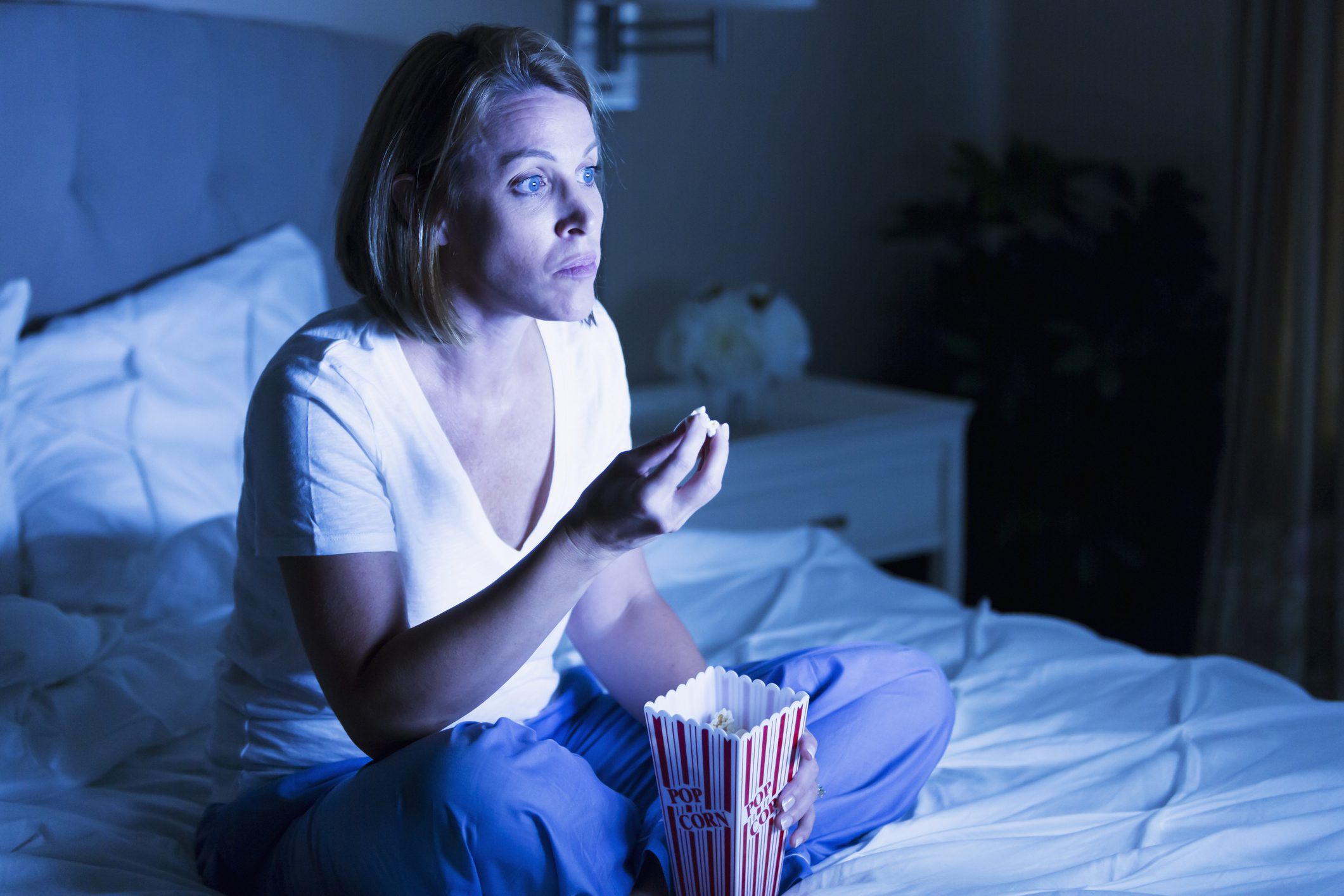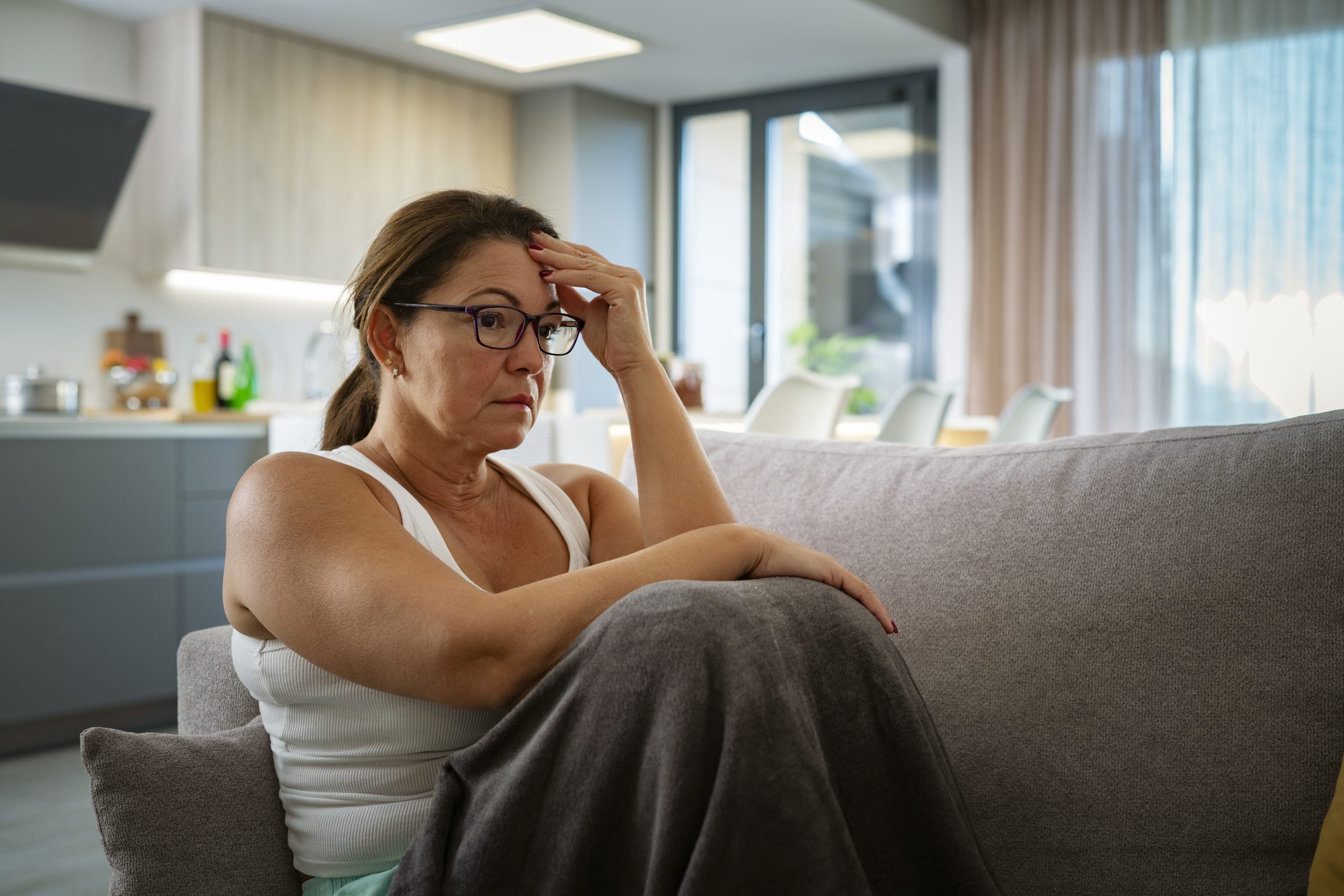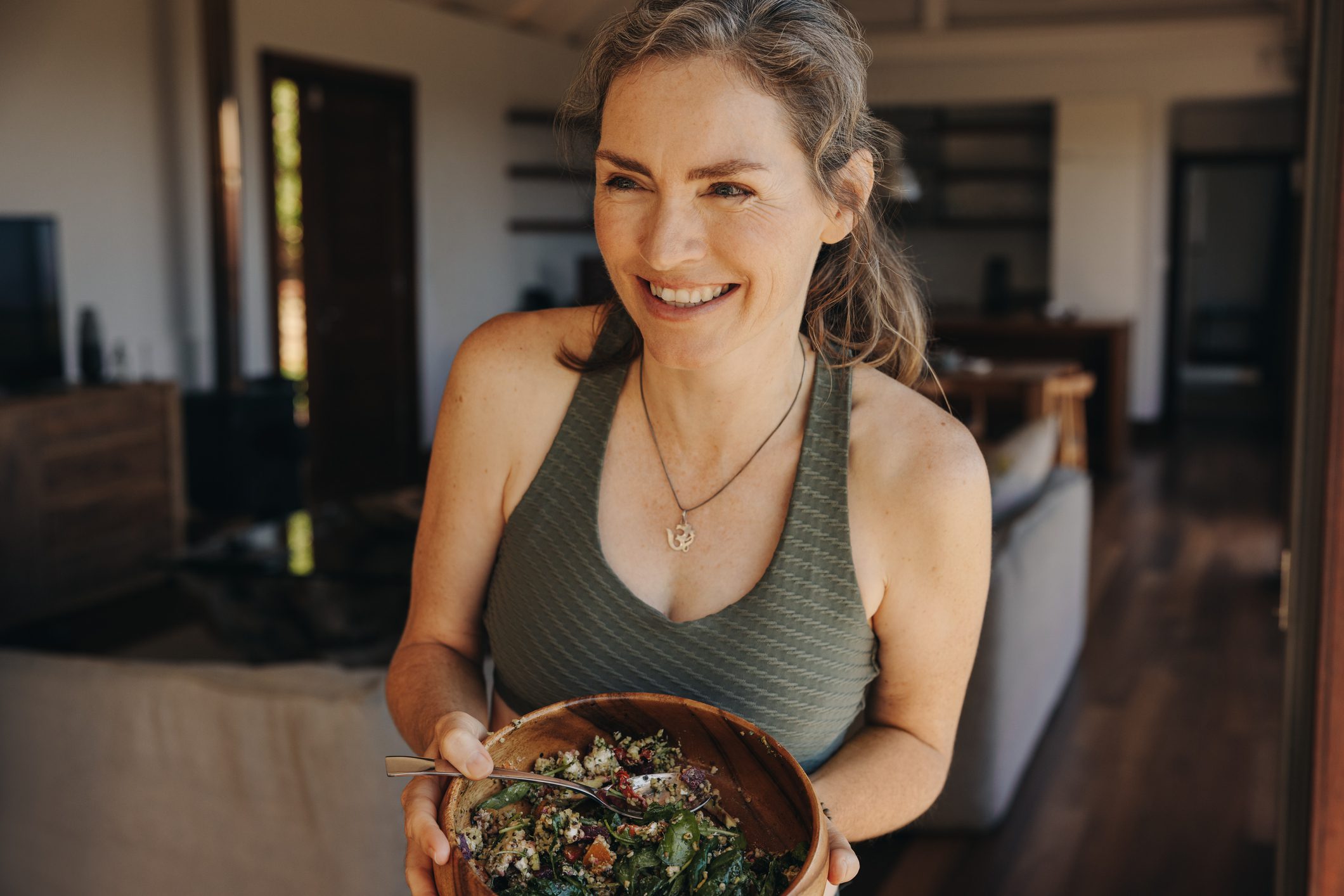Calling all hungry night owls! I know the glow of the open fridge door can seem especially tantalizing at night, but don’t be fooled—that midnight snack is not going to make you feel better. It can impact everything from your hormone levels to your sleep cycle, making it more difficult for you to maintain the weight and healthy lifestyle you want.
Your sleep cycle should be precious. I always say that the single most important thing you can do to improve your health is improve your sleep. Without consistent, quality sleep, every area of your physical and mental health will suffer.
Unfortunately, eating late can disrupt your sleep.1 It becomes a vicious cycle—you eat at night and don’t get enough sleep, and then your hormones, metabolism, and stress levels are all impacted.2 Those changes can throw off your hunger cues and schedule, making you reach for food late at night, and the cycle begins again.
I recommend nipping that cycle in the bud by closing up your kitchen about three hours before bedtime. Let’s check out what happens in your body when you don’t follow that rule.
Why You Shouldn’t Eat Before Bed
1. Eating at Night Can Make You More Susceptible to Insulin Resistance
Years ago, the prevailing idea in the health and wellness space was that what you ate was all that mattered. Just take in and burn a certain amount of calories, and you’ll be able to maintain a healthy weight, right? Wrong.
As I always say, your body isn’t a bank account, it’s a chemistry lab. Your weight isn’t as simple as calories in, calories out.
Once researchers started toying with the idea that when you eat might matter, too, a lot of things started to click.
In one study led by Dr. Satchin Panda, researchers gave two groups of mice the exact same diet—but one of the groups had access to it 24/7, and the other for just eight hours. After a few months, the mice with around-the-clock access to their food showed signs of liver damage and weighed more than their counterparts in the group with the restricted eating window.3
Plus, the 24/7 mice showed signs of insulin resistance, a condition that occurs when your body doesn’t properly respond to insulin. Over time, your body will have a harder time storing and using the energy you feed it, making it more difficult for you to maintain healthy blood-sugar levels and your weight. It can even lead to prediabetes and type 2 diabetes.
Dr. Panda broke down these findings and other related research in his book, The Circadian Code. In it, he dives deep into the ways that eating according to the circadian rhythm can help you reset your internal clock, and kick cravings that come at all hours of the day.
2. Eating at Night Can Impact Your Blood-Sugar Levels
We already know that blood-sugar levels rise when you eat. If you eat a nourishing dinner about three hours before bed, your body will have time to process your meal and regulate your blood sugar again.
If you’re eating too close to bedtime, especially if your go-to snack is high in sugar and carbs, your body will have a more difficult time getting your fasting blood-sugar levels to an optimal place as you rest.
Plus, eating outside of your typical circadian rhythm can impact your glucose intolerance.4 Both of these can be potential precursors to type 2 diabetes.
3. Eating at Night Can Throw Your Hormones Out of Whack
I’m specifically talking about your hunger hormones, ghrelin and leptin. Ghrelin lets you know when you’re hungry, and leptin tells you when you’re full. But they’re not always reliable indicators.
Researchers found that a habit of late-night eating can decrease leptin levels throughout the next 24 hours.5 That means throughout the entire evening and next day, your brain might not be telling you you’re full, even if you’ve had enough food to fuel yourself. You’ll find yourself reaching for food that your body doesn’t actually need, because the wires have been crossed with your hunger signals. And it gets worse.
The same study found that late-night eaters also burned calories slower and didn’t break down and store fat as efficiently as eaters who closed their kitchens hours before bedtime.
Along with sticking to that schedule, another thing I do to increase my leptin is drink green tea throughout the day. I love having my tea, so I was very excited to learn that researchers found it can increase your leptin and reduce your LDL cholesterol (that’s the bad one!).6
Another hormone that really relies on you getting great rest is your human growth hormone. Also known as HGH, it plays different roles at different points in your life. When you’re young, it’s responsible for ensuring your bones and muscles can grow to their optimal size. But it’s just as critical after you’ve finished growing. That’s when HGH goes to work regulating your metabolism7 and helping your cells regenerate and grow.
Most of your HGH production happens at night. So when eating at night throws off your sleep schedule, you’re not going to be able to produce the HGH needed to keep your metabolism running as it should, making it tougher for you to maintain your ideal weight and energy levels.
4. Eating Before Bed Isn’t Great for Your Digestion
Eating according to the circadian rhythm and giving your body enough time to properly digest your food ensures that you’ll actually absorb the nutrients you’re taking in. It also means that you can avoid the uncomfortable symptoms that come with poor digestion, like bloating, gassiness, and heartburn.
Researchers found that lying down too soon after a meal or having what they call a “short dinner to bed time” can increase the risk of GERD-like symptoms like heartburn.8 If you really struggle with some of those uncomfortable symptoms, a short, brisk walk after dinner can also help to give your digestion a little boost and keep your mind off any cravings—it’s one of my favorite things to do after my evening meal.
If you’re still experiencing frustrating reactions to food like bloating and gassiness, my Protein First Enzymes can help. They break down problem ingredients like gluten, soy, and dairy, helping you feel comfortably satisfied after a delicious meal.*
5. Midnight Snacks ≠ Salads
Let’s be honest. When you’re chowing down after dinner, I’m guessing it’s probably not on roasted broccoli or a nutrient-dense smoothie. We’re talking greasy takeout after a night out, buttery popcorn with your favorite show, or promising yourself it’s just one more spoonful of ice cream in your freezer.
As good as you think those foods are going to taste in the moment, I know you’re going to wake up regretting the meal that weighs you down, disrupts your sleep, and damages your overall health.
There are a few things you can do to avoid making a nighttime food decision you’ll regret.
For one, make sure you fill up throughout the day—when you eat by the plate and get enough protein at every meal, you won’t feel ravenous later. And if you’re still fighting cravings, focus on a nighttime routine. By putting your energy towards calming rituals that help you get a restful night’s sleep, like Epsom salt soaks and meditation, you’ll be rewarding your body with the real treat—waking up feeling great.
It all boils down to a pretty simple, common-sense notion: eating during the day fuels your body with the energy it needs to stay active and alert. So why give it that fuel when you need to be at rest?
If getting a great night’s sleep is something you struggle with, check out my Optimal Sleep Kit, a comprehensive guide with science-supported products you need to get better sleep at night—every night!
Sources:
- Crispim, C. A., Zimberg, I. Z., Gomes dos Reis, B., Diniz, R., Tufik, S., & Tulio de Mello, M. (2011). Relationship between Food Intake and Sleep Pattern in Healthy Individuals. Journal of Clinical Sleep Medicine, 7(6). https://doi.org/December 15
- Kim, T. W., Jeong, J. H., & Hong, S. C. (2015). The impact of sleep and circadian disturbance on hormones and metabolism. International journal of endocrinology, 2015, 591729. https://doi.org/10.1155/2015/591729
- Hatori, M., Vollmers, C., Zarrinpar, A., DiTacchio, L., Bushong, E. A., Gill, S., Leblanc, M., Chaix, A., Joens, M., Fitzpatrick, J. A., Ellisman, M. H., & Panda, S. (2012). Time-restricted feeding without reducing caloric intake prevents metabolic diseases in mice fed a high-fat diet. Cell metabolism, 15(6), 848–860. https://doi.org/10.1016/j.cmet.2012.04.019
- Brigham and Women’s Hospital. (2022, October 4). Eating late increases hunger, decreases calories burned, and changes fat tissue. ScienceDaily. Retrieved April 14, 2023 from www.sciencedaily.com/releases/2022/10/221004121928.htm
- Chellappa, S., Qian, J., Vujovic, N., Morris, C. J., & Scheer, F. A. (2021). Daytime eating prevents internal circadian misalignment and glucose intolerance in night work. Science Advances, 7(49). https://doi.org/December 3
- Huang LH, Liu CY, Wang LY, Huang CJ, Hsu CH. Effects of green tea extract on overweight and obese women with high levels of low density-lipoprotein-cholesterol (LDL-C): a randomised, double-blind, and cross-over placebo-controlled clinical trial. BMC Complement Altern Med. 2018 Nov 6;18(1):294. doi: 10.1186/s12906-018-2355-x. PMID: 30400924; PMCID: PMC6218972.
- Sperling, M. A. (2016). Traditional and novel aspects of the metabolic actions of growth hormone. Growth Hormone & IGF Research, 28. https://doi.org/June 2016
- Fujiwara Y, Machida A, Watanabe Y, Shiba M, Tominaga K, Watanabe T, Oshitani N, Higuchi K, Arakawa T. Association between dinner-to-bed time and gastro-esophageal reflux disease. Am J Gastroenterol. 2005 Dec;100(12):2633-6. doi: 10.1111/j.1572-0241.2005.00354.x. PMID: 16393212.
*These statements have not been evaluated by the Food & Drug Administration. Products mentioned are not intended to diagnose, treat, cure, or prevent any disease. The views in this blog by JJ Virgin should never be used as a substitute for professional medical advice. Please work with a healthcare practitioner concerning any medical problem or concern.






